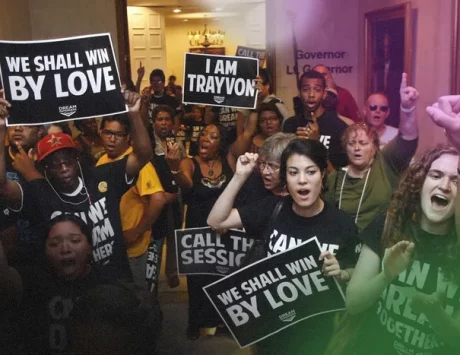
Intelligencer
In March 2012, with George Zimmerman still not charged for the killing of Trayvon Martin, three former student activists, Phillip Agnew, Ahmad Abuznaid, and Gabriel Pendas, issued a call to action on Facebook. Nailah Summers, then a student at the University of Florida, was on the conference call set up to discuss what could be done; she had gone on a school trip to Mississippi, and the work of the Student Nonviolent Coordinating Committee was still present in her mind.
Social-justice history has often been made by the young: Members of the Black Panther Party were on average around 20 years old. The Little Rock Nine were high-school students, and the Greensboro Four were college students. The group on that call soon organized a march from Daytona Beach to Sanford, the town where Trayvon was killed. They named themselves the Dream Defenders, after the famous speech and the Langston Hughes poem. It was a good start, but not until Zimmerman’s acquittal did they galvanize into one of the most effective social-justice organizations in Florida, with chapters — they call them “Squadds” — in seven cities.
Until that verdict, “there hadn’t been a huge high-profile case that our generation was paying attention to,” says Summers. “So we were definitely at that point still holding on to hope.” Today, Summers is co-director of the organization with two other Black women, Jonel Edwards (who was a student at the University of Florida when she became involved) and Rachel Gilmer (who arrived in 2015). “We were hopeful and then we were watching this little TV, and it was just a mess,” Summers says. “We were quiet, we were crying, and then it was just like, ‘Okay, what are we going to do?’ ”
The Dream Defenders gathered in Tallahassee to occupy the State Capitol Building for 31 days, demanding the repeal of Florida’s “stand your ground” law, which had helped get Zimmerman off. The Reverend Jesse Jackson, among other civil-rights notables, showed up to signal support. In the end, they weren’t able to get the law repealed, but the group learned from the experience. “Despite us having been a part of this huge cultural moment, we didn’t really have the political power we needed to win,” Gilmer says. “We saw the people that did have political power. The person who wrote the ‘stand your ground’ legislation is one of the most notorious NRA lobbyists in the country, and she’s based in Florida. We saw her in the halls of the Capitol. We saw the fact that all of our politicians, both Democrats and Republicans, were taking money from the private-prison industry. Coming out of the Capitol, we were really in a place of, We need strategy.”
They needed to set down “our vision for the future of Florida,” Gilmer says. They started by listening — to their members, to people in prison. In 2018, they published the Freedom Papers, “a seven-point platform on what we believe a just world would look like, a world that actually prioritizes our needs instead of criminalizing us,” Gilmer explains. It also took back a word, freedom, that had been co-opted by the right. Its preamble begins, “There are those that will tell you that the corporations magically make this world go round.”
In the past few years, the group created a project called “Blacked Out History” to highlight Black individuals and moments often overlooked, and it launched the “Free the Block” campaign to end cash bail and pretrial detention in Miami-Dade County and Tampa. Members held community forums on the impact of Florida’s House Bill No. 1, passed by Republicans in response to the George Floyd protests; among other things, it reduced the civil liability of anyone running down a protester with a car and potentially increased it for desecrating a Confederate flag. They helped get Monique Worrell elected state attorney for the Ninth Judicial Circuit Court. This past November, one of them, Richie Floyd, was elected to the St. Petersburg City Council.
They did all of this while being careful not to let men take all the credit in an organization staffed mostly by Black and brown women, many of them working class. “I think it’s always been an organization full of women, like many organizations are, but I remember a specific moment where someone was like, ‘I thought Dream Defenders was just for men,’ ” Edwards says. “I remember all of the women being like, ‘Wow, that’s wild. We’re doing all this work, and people perceive this organization as a place that’s only occupied by men.’ I don’t think it was intentional. We did a lot of work unpacking and understanding the ways patriarchy was showing up in the organization.”
The group’s young staff are self-proclaimed police abolitionists, feminists, and socialists, fighting to eradicate policing, prisons, surveillance, and punishment. “When I think of the biggest impact of Dream Defenders, it’s the amount of leaders who have been developed,” Gilmer says. “A place where they got politicized, built their organizing chops, and now they’re out in the world with a lifelong commitment to social change.”
In the meantime, in the race to replace Governor Ron DeSantis, “we’ve got Democrats who do not inspire any kind of excitement or motivation among young people,” Summers says. “We feel like it’s a large part of our role in Florida to make sure we get turnout and make sure young people see their role in local elections as important. We’re going to try to run the biggest electoral program and voter-registration program we’ve ever done.”
Original Article posted on Intelligencer.